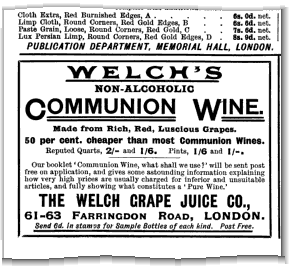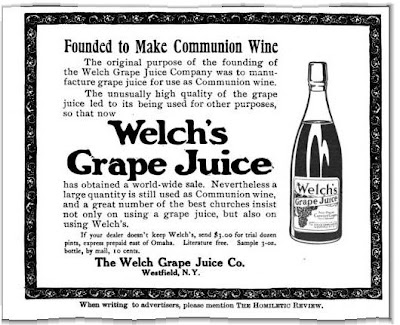Sunday, May 24, 2009
Thursday, May 14, 2009
Discussion on Dr. Welch and Wine
A very good friend sent a reply to the Dr. Welch and Communion Wine blog I wrote. Below are his comments that he sent to me after he read my comments. After his comments

is my own reply to his email.
Kenith
************
This is a great article, but one thing disturbs me, and that is this a direct attack on the convictions of one man. A conviction that me nor you know anything about. Maybe he had an alcohol problem and could not have just one drink, maybe he was allergic to alcohol, who knows. The fact remains that just as the Apostle Paul said we are free in Christ. If one can consume alcohol without guilt then he/she is free in Christ.
Denominations are merely a set of rules that man has created so that he/she can feel free in Christ. I am Baptist because I believe that the rules of this Denomination better fit me and my family, not because I think that only Baptist's will see the Glory of God. There is but one way to that Glory and that is through the Blood of our Savior, a price was paid and by Grace do we receive this Glory. I personally do not have issues with alcohol or those that consume it, but anything consumed in excess then makes it a sin.
"It is good that a mere mortal (like Dr. Welch) can, every now and then, fix God's faux pas." Maybe he wasn't trying to fix God's faux pas, but just trying to give other Christians with convictions or such a way to participate in the Lord's Supper.
++++++++++++++++++

I appreciate your reply to my note. It was, for the most part, meant to be tongue in check, but the information in it is accurate. I intended for the letter to have a little bite to it, but I also meant it to be fun as well, kind of like A.R. Minian in reverse.
I know that there are many Christians that have an "abstinence only" view of alcohol. My problem is how this has been dealt with in the church for the past 150 years.
First, today many Christians wrongly believe and continue to be taught in churches that it is a "sin" to consume any alcohol. This is going far beyond the teaching of Scripture. Those who teach this are forbidding what God has blessed and offered to his people. I don't believe that there is a valid excuse for doing this.
It is sin to say, "though shalt not" where God has very clearly given His blessing. This is the case with wine. We all have liberty to consume or not to consume wine, but that liberty is often denied, despite the clear teaching of the Scripture, and the practice of Godly Christians (including Baptists) for the first 1860 years of
The reason Communion wine has been converted to grape juice, at so many Churches during the last half of the 19th century, was because of a very bad (American) theological movement known as the Temperance Movement. While this movement became popular in many 19th century Evangelical Churches, it actually started among the liberal Unitarians (who deny Christ deity as part of their doctrine). The Unitarians believed in the perfectibility of man and they saw alcohol and something that hampered human perfectibility.
This liberal teaching later began to creep into more orthodox churches, which were doctrinally conservative, but imbibed the temperance position, which was then the rage. Baptist, before the Temperance Movement, had no problem with wine in Communion, and Baptist in
I believe part of our countries alcohol problem today is because Christians worked to make alcohol taboo. In countries like
I personally believe that wine should be served in Communion, because that is what Jesus used when He initiated the Supper with his disciples. It is also what all the Church (Baptist, Catholic, Methodist, Presbyterian, etc…) used before
The way I see it, is some men (1800 years after the fact) decided that wine should no longer be served at the meal Christ gave to us. I think there is a problem with the thinking that brought this about and still sustains this idea. We, as individuals, are free to let the cup go by with out drinking from it, but the Church has not right to change what Christ instituted at the Supper. I hope I am being clear here.
I hope that this further explains where I'm coming from. Thanks again for the letter, and if you want to continue this discussion I am happy to comply.
Later,
Kenith
Sunday, May 03, 2009
Dr. Welch and Communion Wine
 For more than 1800 years Christians drank wine when participating in the Lord's Supper. There was no debate or question as to the use of an "alcoholic beverage" in the Church of Jesus Christ, how could so.
For more than 1800 years Christians drank wine when participating in the Lord's Supper. There was no debate or question as to the use of an "alcoholic beverage" in the Church of Jesus Christ, how could so.The reason for no debate about the correctness of wine in the Eucharist has several causes. One reason was because all Churches from the time of Christ had always used wine and this was simply the normal thing to do. Another reason was, unless you pressed the grapes just before you took part in Communion, the natural yeast on the grape skins would turn juice to wine in short order (transformation from sugar to alcohol complete in less than two weeks).
Dr. Thomas Welch, a dentist, who happened to be Methodist, and a confirmed teetotaler, was bothered by the fact that wine was used for the Eucharist at his, and everyone elses church. He learned of a process, discovered in 1862 by Louis Pasteur, called pasteurization, and he used it on grape juice. This process prevented the juice from fermenting.
Now, for the first time in the history of the Church, the Communion Cup could be drank without evil alcohol being present. We are so blessed to have men like Dr. Welch, who are so much wiser than God, and are able to fix God's occasional errors.
I am certain God meant for the Church to use grape juice, instead of wine, the whole time.,He just needed an English born, New Jersey tee-totaling dentist to figure out the process 1800 years after the fact.
It is also a credit to the American Protestant Churches that so many of them were able to grasp the truth that Jesus, the Apostles, and all the church for over one thousand eight hundred years, had been doing the Sacrament of the Lord's Supper wrong all those many years. What a joy it was to grasp Dr. Welch's Communion correction and finally be able to do what God intended from the beginning, and replace wicked wine with (sinless) Welch's grape juice.
It is good that a mere mortal (like Dr. Welch) can, every now and then, fix God's faux pas.
Coram Deo,
Kenith

